Lionhead rabbits are a recognized domestic rabbit breed by the American Rabbit Breeders Association (ARBA) and the British Rabbit Council (BRC). The rabbits are mainly known for their wool mane that encircles their head and resembles a male lion as the name implies.
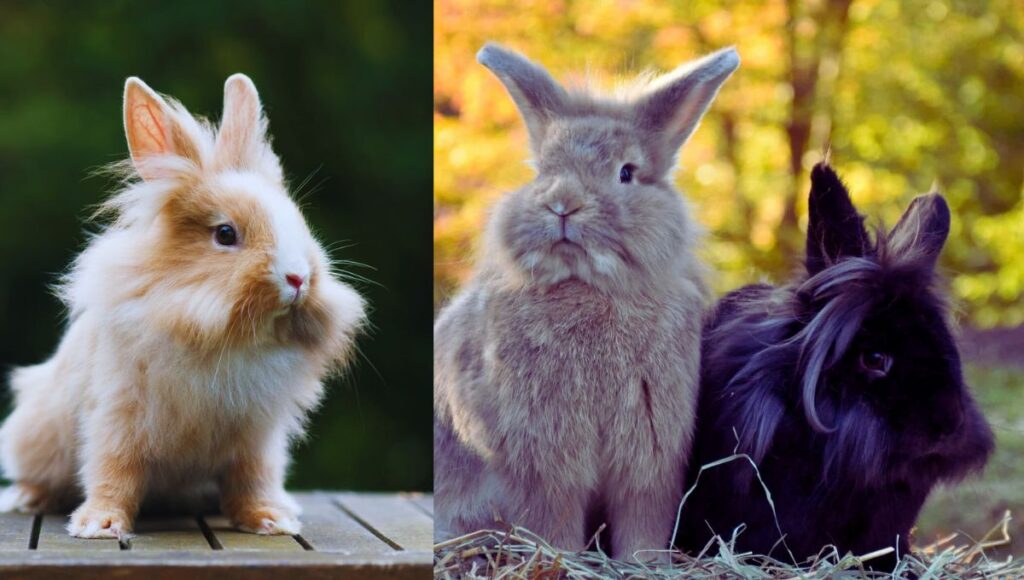
Table of Contents
Lionhead Rabbits in a Glimpse:
| Common Name | Lionhead Rabbits |
| Scientific Name | Oryctolagus cuniculus |
| Other Names | Loewe Kaninchen |
| Adult Weight | 2-3.75 lbs |
| Colors | Seal and Siamese Sable, Sable Point, Blue Eyed White (BEW), etc. |
| Habitat | Cage, hutches, meadows |
| Diet | Grass, Hays, Oats, Spinach, etc |
| Predators | Dogs, cats, foxes, badgers, etc |
| IUCN Status | Not evaluated |
| Gestation Period | 31 days |
| Weaning Age | 1.5-2 months |
| Lifespan | 8-10 Years |
| Colours | Docile, gentle, playful, and intelligent |
| Good Pets? | Yes |
| Jump | 36 inches |
| Speed | 35-45 mph |
| Grooming | Very often |
Everything About Lionhead Rabbit:
Origin:
The origin of Lionhead rabbits is traced in France and Belgium. However, the French Federation of Cuniculture does not recognize the rabbit species. It is believed Lionhead rabbit is a result of a crossing between a miniature Swiss Fox and a Netherland dwarf.
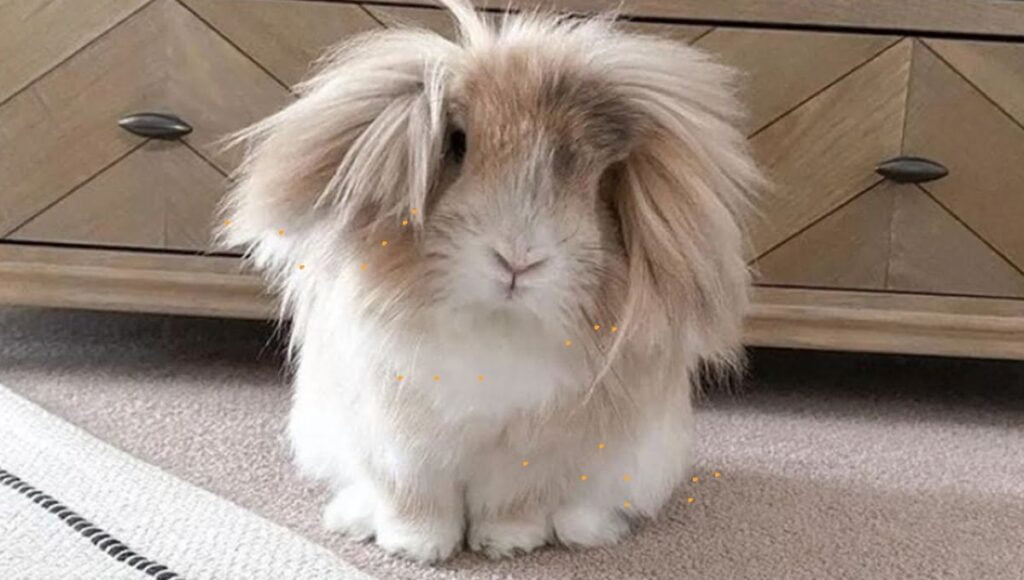
There are other theories according to its origin as many experts believe that the Lionhead rabbit is a product of crossing between a Netherland Dwarf and a Jersey Wooly.
The beautiful rabbits started to become popular in the 1990s and by the end of 2002, BRC had recognized the Lionhead breed.
In 2013, ARBA also accepted Lionhead in two varieties, Tortoise and Ruby-Eyed White rabbit. But in early 2014, Lionhead rabbits become eligible to compete in shows. Currently, it is a well-recognized and popular breed in the USA, UK, and Canada.
Habitat:
The Lionhead rabbits are small domestic rabbit breeds that usually live in cages or hutches. But apart from cages and hutches, the rabbits prefer to live in meadows, grasslands, and parks. However, the rabbits are fickle and often escape to owners’ gardens, yards, and porches. Remember, the rabbits need enough space to move, play, jump, and dig to stay healthy.
Cage Size:
Lionhead rabbits are small but very energetic. Hence they require a lot of space to burn their energy. It is recommended for every domestic rabbit to have at least 3-4 times larger cages than their size so the rabbits can easily move, jump, and play with toys.
In case you lack space, you still have a minimum of 18 in * 24 in a cage with sufficient height (so that the rabbit can stretch fully upright on its hind legs)—however, the bigger the cage, the better for the rabbits.
Physical Description: How do you identify a Lionhead Rabbit?
Lionhead rabbits are small, and compact, and include a high head mount, upright body type, short fur, and ears (2-3.5 in). The rabbits are a small breed and weigh 2-3.75 lbs.
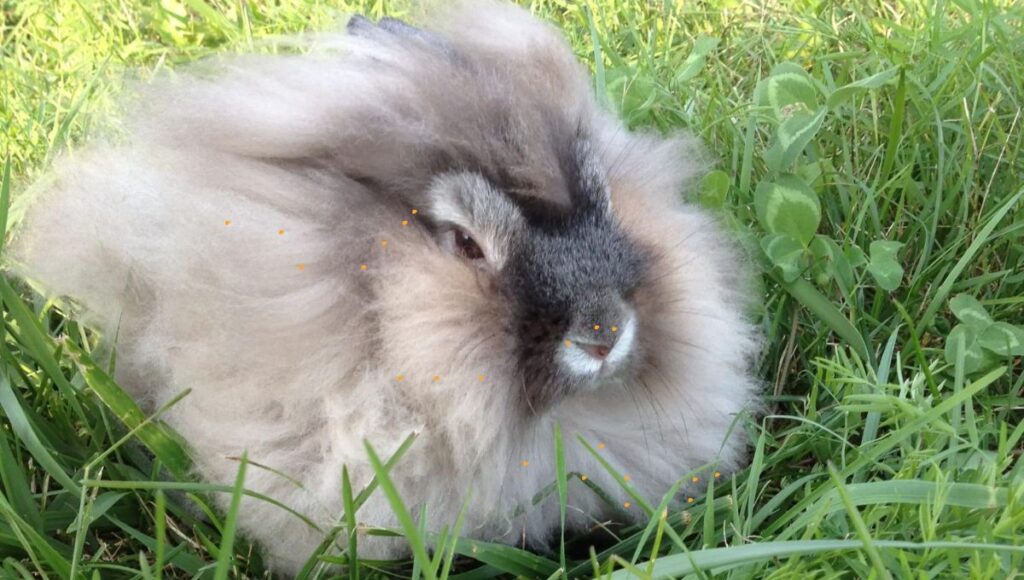
Mane:
A Lionhead rabbit can be either double mane or single mane depending on which genes they inherited from their parents. Usually, the mane is soft, thick, and woolly. If the rabbit inherits double mane genes, it’ll have a double mane, and if it inherits single mane genes it’ll have a single mane. Sometimes Kits are also born without a mane genes known as “no-maned” Lionhead.
How do you identify if a Lionhead is a single mane or double mane?
The only way to figure out if a rabbit is a single mane or a double mane is when the rabbit was first born. A Lionhead having a double mane will have a noticeable V form around its skirt/flanks. Whereas a single-mane rabbit will look similar to a common rabbit directly after birth.
Colours and Fur:
The Lionhead rabbits have soft, thick, and woolly fur. Unlike other domestic pet rabbit breeds, Lionheads need a lot of grooming to prevent matting and tangling and maintain the rabbit in good condition. A single-mane Lionhead will have a wispy and thin mane around its head, ears, chin, and chest. The double mane Lionheads have a much thicker mane on their flanks, also known as a “Skirt”.
American Rabbit Breeders Association (ARBA) has recognized the following colours for the Lionhead rabbits: Seal and Siamese Sable, Sable Point, Blue Eyed White (BEW), Silver Marten, Chocolate, Chestnut Agouti, Pointed White, Tortoise (Black, Blue, Chocolate, Lilac), Ruby Eyed White (REW).
Diets:
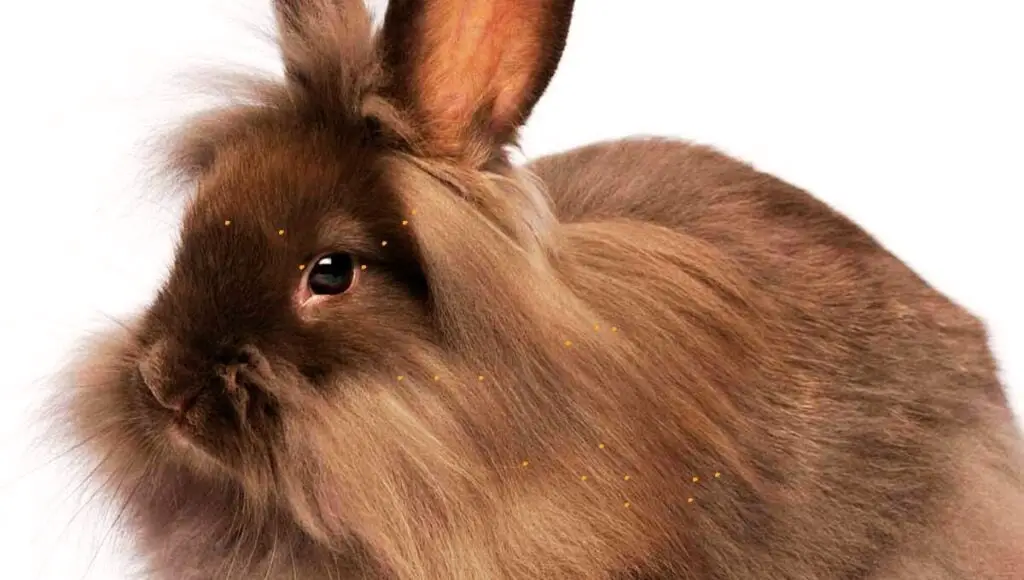
The quantity of diet for a Lionhead rabbit completely depends on its age, size, activity level, and sex. Like other domestic rabbit breeds, 70% of their diets consist of good-quality hay. Good quality hay always provides proper nutritional elements and helps to protect rabbits’ teeth. The remaining 30% of their diet consists of green vegetables ( Lettuce, watercress, basil, kohlrabi, beet greens, broccoli greens, mustard greens, spinach, and cilantro).
If you want you can also feed them commercialized packaged rabbit foods but make sure there is sufficient drinking water for rabbits. A full-grown Lionhead rabbit eats around 1/4th cup high fibre pallets every day. It is advised to give your rabbit a balanced diet in which vitamins, minerals, and fibre are in sufficient quantity.
Predators and Threats:
There are no natural predators of Lionhead. But because of their small size and delicious meat, dogs, cats, larger birds, foxes, coyotes, weasels, and badgers can attack them. Hence while the rabbit is playing outside the house, monitor it closely to save it from the potential predators.
Disease:
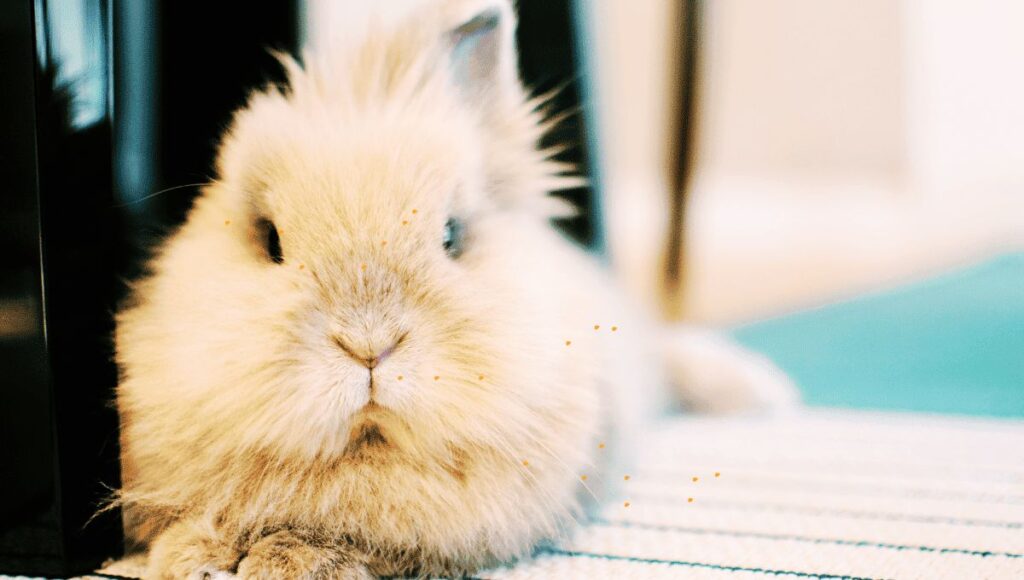
There are no breed-specific diseases for Lionhead rabbits but they can suffer from common rabbit diseases like Malocclusion (when the upper and lower teeth are misaligned and the normal process of chewing is slowed down), Fly Strike (when flies lay their eggs on soiled patches of fur and when the eggs are hatched they start to eat the rabbit from inside out).
Besides them, Lionheads can be affected by Ear Mites (a common parasite that attacks rabbits’ ears and rabbits shake their head very often) and Uterine Cancer (very common among females and treatments are available). Respiratory problems, Ulcers, and teeth problems (overgrown teeth as rabbit’s teeth never stop growing) are also seen in Lionhead rabbits.
Treatments and Care:
Treatments are care are available for every disease of the rabbits. It is advised to bring your rabbit to the veterinary surgeon once every six months for a regular check-up. But if you find your rabbit shows disease symptoms, you should immediately take action and visit the surgeon.
Conservation Status:
The conservation status of Lionhead rabbits hasn’t been evaluated in the IUCN Red List of Threatened Species due to the unavailability of proper data.
Reproduction:
Usually, Lionhead rabbits reach sexual maturity at 4-6 months of age. Like other domestic rabbits, Lionheads are prolific breeders and females can produce several litters in a year. The litter size usually varies between three and six kits. The gestation period of the rabbits lasts for 31 days (approx).
Lifespan:
Lionhead rabbits are generally known for their longer lifespan. They are one of the most healthy rabbits in the world. They usually live 8-10 years but with proper care, they can live up to 12-14 years. However, disease and other physical health problems may shorten their lives.
Behaviour: Are Lionhead rabbits a good pet?
Lionhead rabbits are small and known for having a fantastic temperament that makes them one of the most friendly domestic rabbit breeds worldwide. The rabbits are very energetic and don’t like to be confined in their hutch or cage for a long time. They love human company and play with family members. They often hop into family member’s lap and play with them.
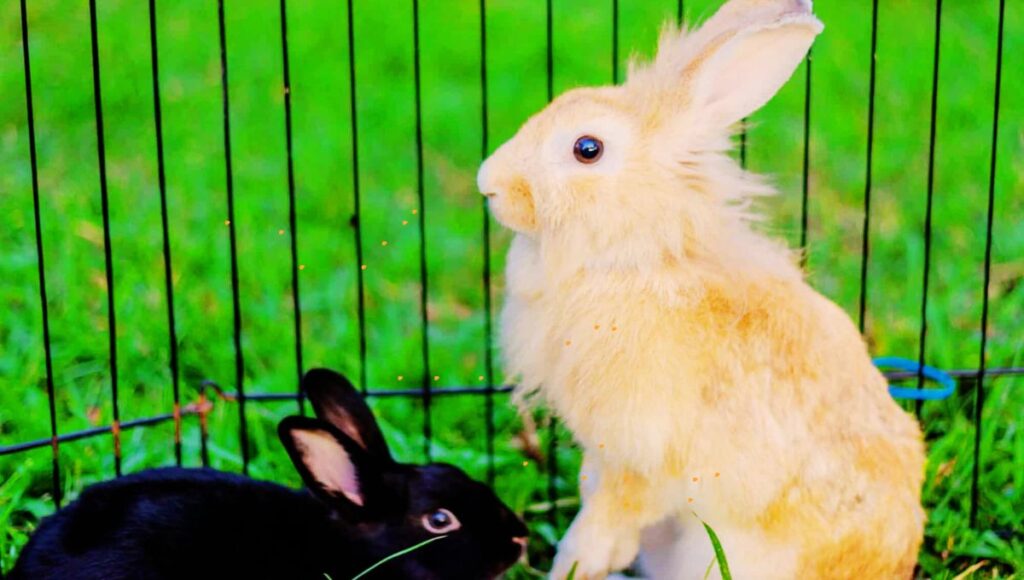
Unlike other domestic rabbit breeds, Lionheads need time to create a bond with family members. Once they create the bond, they often run around the house, play with family members with the toys, and love being petted and picked up by the human. If you are planning to buy a Lionhead, you need to respect their personal space in the beginning. Otherwise, they might feel afraid and try to bite.
Lionheads are great for any type of family. They create a strong bond with family members over time. The rabbits are smart and they can be trained pretty easily. Hence anyone, regardless of their age, sex, and experience can pet a Lionhead. Rabbits are easy to train but more challenging than a cat or dog and a bit of patience is needed while training any domestic rabbits.
One of the side effects of having Lionhead is you have to give the rabbit a lot of time every day. As they love to play with humans, they need your attention and play with you. If they don’t they might create trouble and injure themselves.
Training:
As mentioned above, Lionhead rabbits are very easy to train and you can easily give them litter training and potty training with very little effort. Always keep the litter box away from the rabbit’s eating place. Using a leash, you can also give the rabbit a walking training. Lionheads are good enough to adopt new skills.
Grooming:
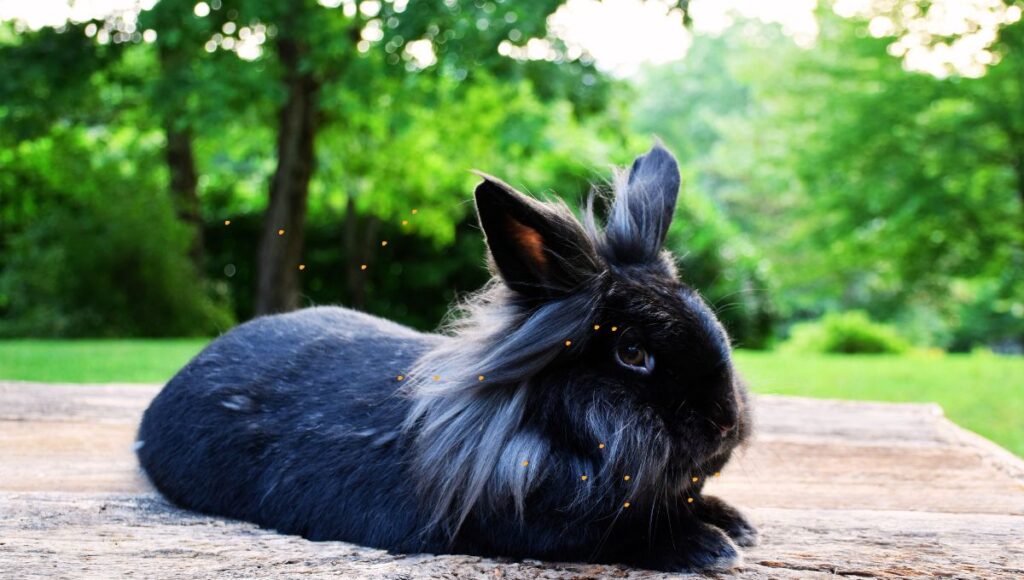
Unlike other domestic rabbits, Lionheads require a lot of grooming due to their wool fur and large mane. It is advised to groom the rabbit at least twice a week to keep their coat and mane in good condition and matt and tangle-free.
During shedding season, you must groom them thrice a week to maintain their fur soft and free of knots. Grooming not only helps to maintain the fur soft and clean but also helps to prevent from swallowing too much of their fur which might cause health problems like GI Stasis.
Bathing can be a very bad experience for Lionheads. Try not to bathe them unless it is very much required. But always keep their ear clean and trim their nails whenever needed.
Exercise:
The rabbits are small but contain a lot of energy. They don’t love to confine themselves in a cage or hutch. Instead, they love to play, jump, dig, and run in the house or the garden. They need at least 2-3 hours of exercise every day in the outside to maintain their energy level and stay fit.
It is advised to monitor the small rabbit very closely to protect it from predators like dogs, cats, badgers, coyotes, or larger birds. Otherwise, the predators can harm the little rabbit for their delicious meat.
Speed and jump:
Lionhead rabbits can run at a speed of 35 mph or 56 kph. However, sometimes they can reach the speed of 45 mph or 73 kph. Lionheads can also jump up to 36 in or 92 cm.
About Lionhead Rabbit’s Sale: How to purchase a Lionhead?
Lionheads are one of the most popular domestic rabbit breeds around the world due to their mane. It is very easy to find them at your local pet shop or you can buy them from a rabbit breeder. However, depending on the location, you can purchase them online as well.
What is the price of a Lionhead rabbit?
The price of the small rabbit often varies depending on the location and quality of the rabbit. However, the price of a Lionhead starts from $30 and it can be as high as $125. But if you want a show-ready rabbit, it might cost more than $300 in the USA.
5 Facts to Remember Before Purchasing a Lionhead:
- Lionheads have a very bad habit of chewing everything on the floor. Hence, you need to make the room rabbit-proof and keep the floor free from sharp objects and electric wires.
- Rabbit’s teeth never stop growing; sometimes, they grow into their jaws and face. It is a very painful incident for a rabbit which causes a lot of pain and prevents the rabbit from eating. Hence, if you find any overgrown teeth in the rabbit, quickly consult a veterinary surgeon.
- Lionheads need a lot of daily exercise outdoors. While exercising outdoors, you need to monitor it closely to protect the small rabbit from potential predators.
- It is advised to bring the rabbit to a veterinary surgeon twice a year for a regular health check-up. But if you find any disease symptoms in the rabbit, consult the surgeon immediately.
- If you are planning to buy a Lionhead, make sure you have enough time for the rabbit. The rabbits are very demanding from the owner. If you cannot give the rabbit enough time and attention, they’ll create trouble for everyone and sometimes may bite.
FAQs:
Can you keep the lionhead rabbit indoors?
Yes, it is safe to keep your lionhead bunny indoors. Lionheads are generally a small breed and are also known for their delicious meat. Predators like dogs, cats, badgers, coyotes, foxes, or larger birds can attack the bunnies and hence it is safer to keep the rabbit in a cage or hutch. But the bunnies also need the proper amount of exercise outdoors. It is advised to monitor your rabbit closely while it is playing outside your house (garden, park, etc).
Do the lionhead rabbits like to be cuddled or picked up?
Yes, lionhead bunnies are very friendly and they love the attention of the owner or the family members. They don’t like it if they are unattended for a long time. The bunnies easily become close to the family members and enjoy being petted, cuddled, and picked up by humans.
How big can a lionhead bunny become?
Lionheads are usually small rabbits and they are one of the smallest domestic rabbit breeds. It is reported that a Lionhead can become as heavy as 3.75 lbs or 1.7 kg.
Are lionhead rabbits aggressive?
Generally, lionheads are not aggressive but might be aggressive during mating season or if the rabbits are threatened. Apart from that, in case the rabbit is injured or is new to your home and unfamiliar with the members, it can show aggression as a part of self-defence.
Also Read:
English Spot Rabbit: Everything You Should Know Before Purchasing
Tan Rabbits Pet Guide: Top 7 Facts to Know Before Buying
Are Mini Lop Rabbits Good Pets? 7 Important Facts to Know Before Buying
Are Polish Rabbits Good Pets? 13 Interesting Facts to Know Before Purchasing
Are Satin Rabbits Good Pets? 17 Facts to Remember Before Purchasing a Satin
Are Rex Rabbits Good Pets? 13 Facts You Should Know Before Purchasing a Rex